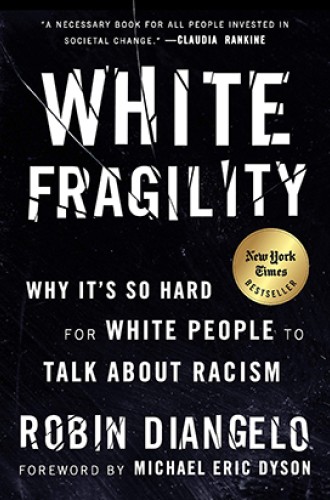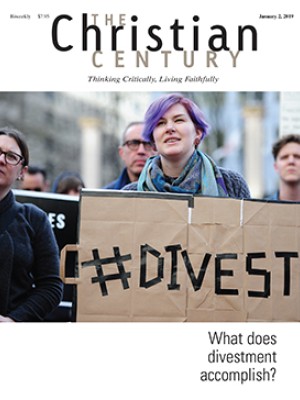The American version of the sitcom The Office declared its independence from its British predecessor with its second episode, “Diversity Day.” The show’s fictional company decides to convene morning meetings to discuss race and ethnicity in the workplace after one of its branch managers, a white man, recites racial jokes from African American comedian Chris Rock.
During the training, the manager insists that he’s done nothing wrong and that he could run the diversity session more effectively than the professional consultant. The manager then parades around with an index card taped to his forehead which reads “Martin Luther King Jr.” as he prods his staff to voice ethnic and racial stereotypes. In 2005, this was how the show’s writers endeavored to make it quintessentially American.
Read our latest issue or browse back issues.
More than a decade later, fact followed fiction. After police in Philadelphia arrested two African American men at a Starbucks and the story caught fire on various forms of media, company executives decided to close roughly 8,000 locations for a day for mandatory training sessions. Officials presented the company as “color brave,” willing to confront racism directly.
On the day of the diversity training, almost 200,000 Starbucks employees spent several hours watching videos and discussing the power of race and stereotypes in their workplaces and lives. At some locations, angry consumers pounded on doors, demanding their mocha Frappuccinos or other beverages of choice. While some employees bemoaned the day as a waste of time, others wept with pride that they worked for such a progressive company.
Both scenarios are case studies in what Robin DiAngelo terms “white fragility.” According to DiAngelo, white people as a collective are so defensive, so quick to speak, so opposed to being viewed as complicit in anything deemed racist, and so committed to their own perspectives that they fail to comprehend what it would take to make substantive changes to American society. When it comes to problems of race, whites’ capacities as a group resemble those of young children: they either fail to understand, feel overwhelmed, throw temper tantrums, or offer simplistic solutions. Along the way, white people seek to draw as much attention to themselves as possible.
The Starbucks case exposes the shallowness that white fragility creates in conversations about race. The company took six weeks to create a curriculum attempting to address almost 600 years of oppression and exploitation. It allocated four hours to change the attitudes of many individuals whose entire existences have been structured by privilege. The entire charade exposes white progressive efforts at racial justice as no more effective than Band-Aids thrown to bomb victims.
DiAngelo’s book is not for the faint of heart. That is, it’s not for white people who are faint of heart. Unlike whites, African Americans as a group have generated deep and wide capacities to handle racial issues. They’ve had no other choice. They’ve had no escape from the gaze of neighbors, the demands of police, and the disparaging comments about how and why they achieved their failures or successes. Alternatively, as DiAngelo details, white people have created a universe of privilege to insulate themselves. One way they maintain their privilege is through their fragility: they cry foul and protest when confronted with racial inequities, particularly if they are considered complicit.
Crucial to DiAngelo’s concept is the systemic (rather than individual) reality of racism. As she puts it, “racism is a structure, not an event.” By this, she means that there are so many factors creating racial differentials that the system of racial privilege does not need individuals to act on its behalf. Privilege is built into the fabrics and functions of society, allowing white people as a whole to grow up and live with freedoms they do not have to recognize. They see people who look like them on television. The vast majority of their teachers are white. The politicians who make decisions are overwhelmingly white.
DiAngelo attempts to expose how white privilege sustains itself. White fragility builds from white people refusing to regard themselves in racial terms. Instead, they pivot to other categories such as class or gender. When confronted with realities of race and racism, whether in the form of diversity trainings or the horrifying violence seen in media outlets, white people rely upon simplistic notions. They emphasize one or two actions they have taken. They voted for Barack Obama. They had two black friends in college. They love basketball and listen to black musicians. None of these responses addresses broader structural issues like wealth, incarceration, and life expectancy differentials. When pressed to step back and see the power of race—how it determines more outcomes for more people than any other factor in the United States—well-educated white people, smart and savvy white people, seem only able to speak from their fight-or-flight instincts.
The chapter that may be most difficult for some readers addresses white women’s tears. Like Ruby Hamad’s essay “How White Women Use Strategic Tears to Silence Women of Color,” DiAngelo emphasizes external outcomes rather than emotional intentions. When white women cry during conversations about race, she points out, the tenor of the room changes. Members of the group expect the conversation to stop, the individual to be comforted, and those drawing attention to the structural outcomes of racism to qualify their positions. The meaning of the moment shifts as concern becomes individualized for the tearful one. In the analogy of one activist, these moments are like “first responders at the scene of an accident rushing to comfort the person whose car struck a pedestrian, while the pedestrian lies bleeding on the street.”
The solutions to systemic racism are not easily found, but DiAngelo’s demonstration of the perniciousness of white fragility is crucial for any way forward. This may not be a book for the faint of heart, but it is one all white progressives should read.
A version of this article appears in the print edition under the title “Tough talk about racism.”







